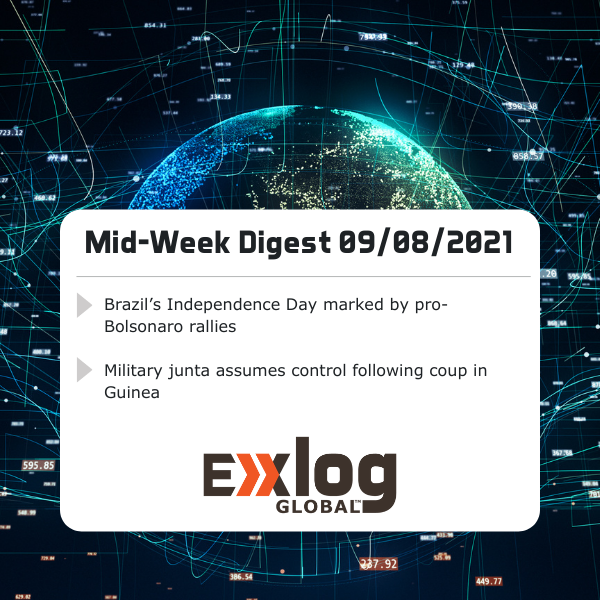Brazil’s Independence Day was marked by pro-Bolsonaro rallies and Military junta assumes control following a coup in Guinea
Brazil: Independence Day marked by pro-Bolsonaro rallies; anti-government protests planned for Sept. 12
Supporters and opponents of Brazilian President Jair Bolsonaro marked the country’s Independence Day, Sept. 7, with large, mostly peaceful demonstrations in cities across the country. At least 275,000 people reportedly turned out in Brasilia, Sao Paolo, and other urban areas. The scenes at the rallies appeared to be festive with no reports of serious violence, though some demonstrators in Brasilia clashed with police barricades protecting the Supreme Court – which is currently engaged in legal disputes with Bolsonaro, his political allies, and several family members over a host of issues including corruption and alleged political attacks on the country’s democratic systems. Pro-government protesters had previously vowed to occupy the court, citing the Jan. 6 occupation of the US Capitol by supporters of then-President Donald Trump as an inspiration. Anti-government activists also staged counterdemonstrations across the country, though opposition leaders have urged their followers to avoid clashes and instead turn out for even larger protests on Sept. 12.
Previous anti-government rallies have called for Bolsonaro’s impeachment due to his response to the COVID-19 pandemic. Though his removal from office appears unlikely given the partisan makeup of Brazil’s Congress, Bolsonaro’s approval rating has reached record lows; recent polls show him trailing former left-wing president (and possible future presidential candidate) Luiz Inacio Lula da Silva by a large margin. This deep unpopularity has led some critics to accuse Bolsonaro of inciting political violence as a means to garner support ahead of Presidential elections in Oct. 2022. Amid mounting tensions and escalating rhetoric, clashes between rival groups of protestors and severe unrest targeting government buildings in Brasilia are increasingly likely in the months ahead of the vote.
Guinea: Military junta assumes control after ousting President Alpha Conde in successful coup
A military junta has assumed control of Guinea after deposing President Alpha Conde in a successful coup on Sept. 5, thrusting the mining-rich nation into a period of uncertainty. Following hours of intense gun battles outside of the Presidential Palace, Col. Mamady Doumbouya appeared on state television announcing that his special forces unit had seized control of the country and arrested Conde, countering an initial statement from the Defense Ministry claiming security forces had repelled the coup. Doumbouya stated he would be dissolving the government and constitution, citing widespread poverty and “endemic corruption” within Conde’s administration. The junta has since taken steps to solidify their hold on the country, including forbidding ministers from traveling abroad and replacing governors with regional military commanders. Authorities have also closed land and air borders for one week and implemented a nationwide 2200-0500 nightly curfew; notably, however, maritime borders remain open for the export of mining products, and the curfew does not apply to mining areas so that production may continue. Though no mining disruptions have been reported since the coup transpired, markets for top exports (especially bauxite) have fluctuated as the country’s stability remains in question.
Several international and regional bodies including the US, African Union, and ECOWAS—a regional economic group comprised of 15 West African nations—have condemned the coup and demanded Conde’s immediate release. Additionally, ECOWAS has called an extraordinary meeting to discuss the ongoing situation in Guinea on Sept. 9. ECOWAS has a mixed history of intervening militarily in member nations following coups, suggesting the possibility of an outside military solution in the near term. Furthermore, the threat of internal unrest remains elevated over the medium term. While Conde’s arrest was met with large street celebrations in Conakry, the popular mood could quickly sour if the junta fails to deliver on its promise to establish a unity transitional government and take steps to improve living conditions for the poorest Guineans.


